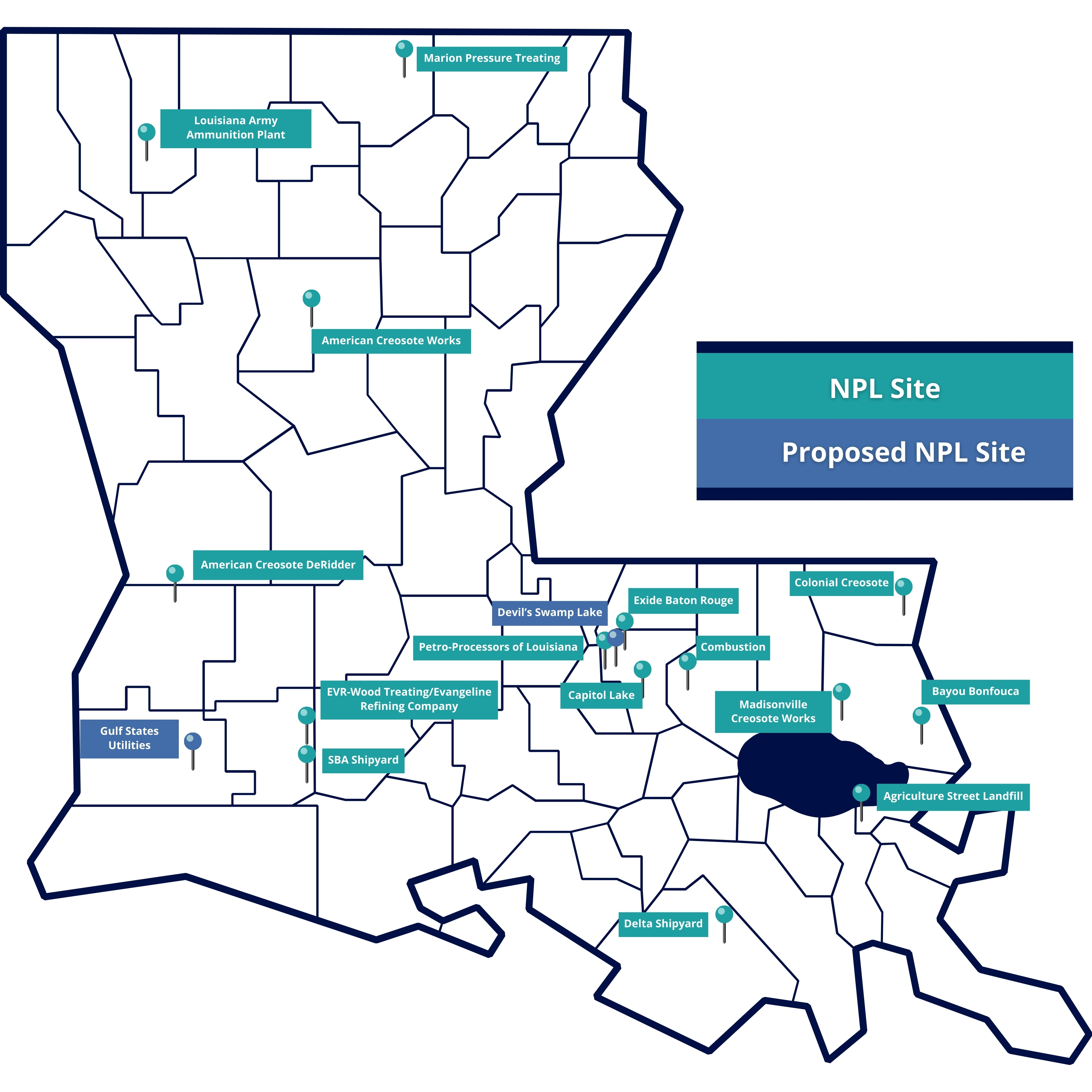Public Health Assessment Program
The Public Health Assessment Program reviews soil, sediment, water, and air data collected from facilities and communities where chemical releases have occurred. The Louisiana Department of Health, Office of Public Health's Section of Environmental Epidemiology and Toxicology (SEET) does this by:
- determining whether the public is being exposed to contamination from a site,
- evaluating potential links between site contaminants and community health, and
- educating affected communities and local health professionals about site contamination and potential health effects.
The program also works with the Louisiana Department of Environmental Quality (LDEQ) and the Louisiana Department of Wildlife and Fisheries (LDWF) to keep the public safe from mercury and other chemicals in wild-caught fish through the Fish Consumption Advisory program.
LDH performs public health assessments through a cooperative agreement called APPLETREE, which stands for the Agency for Toxic Substances and Disease Registry’s Partnership to Promote Localized Efforts to Reduce Environmental Exposure.
APPLETREE:
- Prepares documents about our public health assessment activities for sites across Louisiana.
- Works with the Louisiana Tumor Registry and other agencies to investigate potential disease clusters.
- Provides help to Early Child Care owners and operators through our Choose Safe Places for Early Care and Education Program.
Environmental Protection Agency (EPA) Resources & Tools:
- EPA Envirofacts: Find data about environmental hazards in your area
- EPA Superfund: Find contaminated sites that are being cleaned
- EPA Toxics Release Inventory (TRI) Program: Learn about toxic chemicals in your area and how they are being managed
Some of the sites that LDH’s APPLETREE program assesses are on the National Priorities List (NPL) of the sites in most need of investigation and cleanup.
Louisiana National Priority List (NPL) Sites
As of October 2024

The Louisiana Department of Health/Office of Public Health/Section of Environmental Epidemiology and Toxicology (SEET) cannot guarantee the accuracy of the information contained on this map and expressly disclaims liability for errors and omissions in its contents.
For more information on Superfund Sites where you live, visit the Environmental Protection Agency's (EPA) Superfund data system.
Choose Safe Places for Early Care and Education
Choose Safe Places for Early Care and Education (CSPECE) is a federally funded program through a Cooperative Agreement with the Agency for Toxic Substances and Disease Registry (ATSDR).
Children are more vulnerable to chemical exposures than adults because they are smaller and still developing. The Choose Safe Places for Early Care and Education (CSPECE) Program teaches early child care and education center owners and operators how to look for potential sources of chemical exposures as they decide where to open new childcare sites
Information about CSPECE and resources for child care owners and operators are available at LDH’s CSPECE Homepage. Additional resources are available through the ATSDR’s CSPECE homepage.
Resources
- Agency For Toxic Substances and Disease Registry (ATSDR)
- Assessment Reports for Louisiana
- ATSDR Cooperative Agreement Program
- Consumer Products Safety Commission
- Environmental Protection Agency (EPA)
- Health Effects of Exposure to Substances and Carcinogens
- Louisiana Department of Environmental Quality (LDEQ) Citizen Complaint Form
- Region 6 (EPA)
- Superfund Community Involvement
- ToxFAQ's
- What is a Superfund Site?
Contact
For more info, call LDH's Section of Environmental Epidemiology and Toxicology (SEET) at 1-888-293-7020.
 Official Louisiana State Websites use .la.gov
Official Louisiana State Websites use .la.gov  Secure .gov websites use HTTPS
Secure .gov websites use HTTPS 